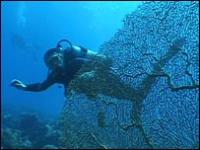







|
News and Information
CO2 emissions put corals at risk
| February 1, 2005 |

By Roger Harrabin
BBC special correspondent
Diving amongst the coral (BBC)
Fisheries and tourism depend on healthy coral
Israeli scientists predict the world's coral reefs could begin to collapse in as little as 30 years from now.
Studies show the oceans are becoming increasingly acidic as they soak up manmade emissions of carbon dioxide.
The Hebrew University of Jerusalem researchers say this will make it difficult for many coral organisms to produce skeletal and other hard parts.
The team's work on corals in the Red Sea suggests a tipping point will be reached in between 30 and 70 years.
Then the forces of erosion eating away at corals will outstrip the organisms' ability to make the reefs.
If the researchers are right, the economic consequences for nations that rely on coral could be serious. Coral brings tourists, serves as a nursery for fisheries and buffers small island states against the waves.
Chemical clues
The Red Sea work conducted by Professor Jonathan Erez and colleagues is awaiting publication.
The team has been taking chemical samples of the seawater on the reef at Eilat. These show how much calcium carbonate is being extracted from the ocean and indicate how fast the reef is growing.
Jonathan Erez (BBC)
As an ecosystem our grandchildren will not see coral reefs any more
Prof Jonathan Erez,Hebrew University of Jerusalem
Levels of acidity fluctuate in the Red Sea seasonally, depending on the cycling of water. The team says it has found that at times when natural causes make the water more acidic, the corals grow more slowly.
"This ecosystem, which is the most productive and diverse in the ocean, is going to disappear as an ecosystem," Professor Erez told the BBC Newsnight programme.
"The individual components may survive here and there but as an ecosystem our grandchildren will not see coral reefs any more and I think this is too big a loss for our society."
The Israeli open water study builds on experiments at Columbia University's Biosphere 2 Center, which suggested that coral growth could be reduced by as much as 40% from pre-industrial levels over the next 65 years.
Pace of change
Ocean scientists generally accept that the pH level measuring acidity and alkalinity has fallen by around 0.1 since the Industrial Revolution. Absorption of CO2 appears to be patchy with some areas worse than others.
The oceans currently have a pH of about eight, but experts predict this could drop as far as 7.6, depending on whether CO2 emissions are cut. Professor Erez believes that reefs could begin to crumble if pH drops by 0.3 or 0.4.
The effects could be equally serious for cold water organisms, although the science on these is not so far advanced.
Professor Ulf Riebesell, from Kiel University, and a member of the UK Royal Society's working group examining ocean acidification, told the BBC that if CO2 levels continued to rise, the oceans could be more acidic in 2100 than they had been for 400 million years.
This is beyond the evolutionary memory of most sea creatures. And many of them may not be able to adapt to the pace of change.
Complex climate
Dr Carol Turley, from Plymouth Marine Laboratories told this week's Met Office and UK government-organised climate conference in Exeter she was very worried.
Countless species, she said, depend on a relatively stable pH to extract calcium to build their shells or skeleton. These include shellfish, snails, starfish, sea urchins and some sea worms that play an important part in cycling minerals in the ocean mud.
Coccolithophorids under the microscope (BBC)
Tiny coccolithophorids form vast populations
She is particularly concerned about the effects of acidification on plankton at the bottom of the fisheries food chain called coccolithophorids.
These precipitate calcium to make tiny shells called liths. Each lith is only about 2.5 micrometres (millionths of a metre) across but when the algae bloom en masse the effects can be seen from space.
Unpublished research from Norway suggests that increasing acidity harms the coccolithophorids. This might have consequences for fisheries. Scientists think coccolithophorids will probably be replaced if they drop out of the food chain but they cannot be sure.
Coccolithophorids also play a role in climate change. The algae give off CO2 when they bloom and thus contribute to climate change. But they also produce dimethyl sulphide when they bloom which helps the formation of clouds which reflect back heat from the Sun. The science here is still in its early stages.
Healthy coral (BBC)
Under pressure from higher temperatures, pollution, disease, and soil run-off
The chairman of the Royal Society working group, Professor John Raven, told the BBC that scientists had been slow to spot the implications of the rise in mankind's CO2 for the oceans.
"We were all taught that the pH of the sea was a constant," he said.
"We are rather embarrassed to find out that is not the case, because it is really only basic chemistry that [tells you] it would not be possible for the ocean to absorb ever-increasing amounts of CO2 without becoming more acidic.
"We have started a great experiment here and we don't know yet what the consequences will be." |
Source: www.bbc.com |
| http://news.bbc.co.uk/2/hi/science/nature/4226917.stm |
|
| Support Caprivi Freedom |
Fill out the form below to become a member of this site and receive our regular newsletter.
|

|

